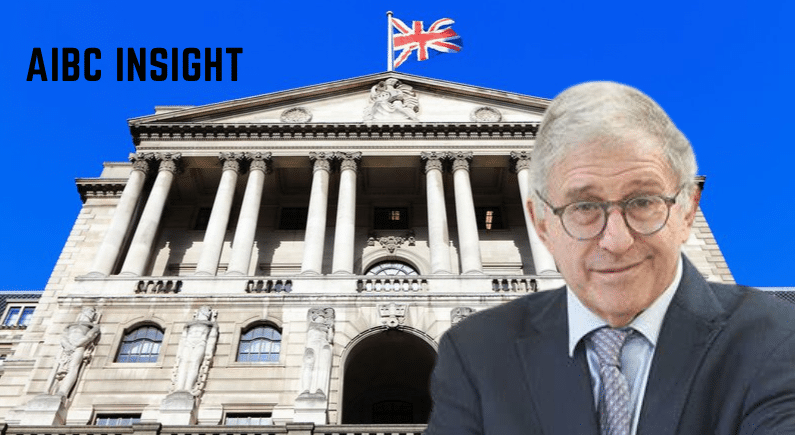AIBC Insight – ‘This is a classic run on the banks’ says financial risk guru

The London Stock Exchange suffered another blow yesterday with stock retreating to an all time low.
Investors are shaken by the collapse of Silicon Valley Bank and fears that the economy may be on the edge of a crisis. Shares in top European banks also plunged this week. Credit Suisse is facing serious trouble and its share price has dropped to a new record low. The bank’s shares have even been temporarily suspended on the Swiss Stock Exchange.
Will markets face a ‘2008 style’ crisis?
Market analysts are predicting that other banks exposed to Credit Suisse could face similar trouble. The London top tier index declined by nearly 4 percent with a drop even bigger than the market reaction to the UK’s mini budget in September last year. Prudential Insurance Group recorded losses of more than 10 percent and Barclays Bank declined by 8 percent. Standard Chartered slid by more than 6 percent and HSBC was down by 5 percent. The Stock Exchange in France tumbled more than 3 percent and the German Stock Exchange slid by more than 2.5 percent.
Analysis and potential systemic risk
AIBC News discussed this week’s financial turbulence with Professor Colin Lawrence, former Director of the Bank of England and Professor Emeritus of Finance at Columbia University.
The globally recognised financial risk guru highlighted that the US banks, namely Silvergate, Silicon Valley Bank and Signature Bank, were relatively small mid tier banks.
The Fed and Central Banks in the UK and Europe acted very swiftly, something that never happened in the Big Crash in 2008 when they did not act until it was too late. I’m pretty hopeful that there is no further fall out from this but I should tell you that the share market is jittery and banks have been falling in share value. For example in San Francisco the First Republic Bank fell by 60 percent which means that people are worried particularly about the cryptocurrency market will withdraw deposits. This is a classic run on the banks .” – Professor of Colin Lawrence, former Executive Director of the Bank of England
Professor Lawrence explains that SVB is a tech company bank that deals fundamentally with the tech sector. Start ups paid deposits with the bank and it raised funding through venture capital firms. Furthermore it became like a social hub and there was a community of depositors which was part of the fintech Silicon Valley world. But the most important thing to note, adds Professor Lawrence, is the poor management of SVB. In order to attract deposits, SVB paid out interest. The bank put its money in long term treasury debt and some mortgage backed securities and when interest rates rose, the actual value of these fell immediately and dramatically. It is like a mismatch – they borrowed short term and lent long term. It is very much like the ‘savings and loans crisis’ that happened in the 1980s.
This time though the Fed in the US acted decisively. They guaranteed the full value of the deposits over and above the FDIC which pays only up to US $250 0000 to try and stem the tide. It is the same as the entire crypto market that is based on social panic and driven through social media. Even with all the guarantees people still continued withdrawing and this triggered a perception that this could happen to all sorts of other banks.” – Professor of Colin Lawrence
Regulators are coordinated this time. They did this very quickly There is a top up from Janet Yellen, Secretary of the US Treasury over and above the FDIC (Federal Deposit Insurance Corporation). It means that people will not lose any money. And this It is different because of the speed in which coordination of Central Banks acted. This has prevented a greater bank run. There is a lot of social perception in the market place. The Federal Reserve also unveiled a lending programme which is the ‘bank term funding programme’ The speed which Secretary Yellen guaranteed a full pay out for depositors to stop the flow of deposits. This funding programme means that any bank that has liquidity funding can go to the fed and file to get short term funding over a period of time to stem this crisis.
Banking – traditional and virtual
This is not only happening to the smaller banks, clarifies Professor Lawrence. He explains how all the banks, traditional and virtual are heavily interconnected. The larger banks for example such as JP Morgan, Bank of America, Wells Fargo, Citibank are all very heavily capitalised since the crisis of 2008 – the great recession – and it stems any systemic failure.
He continues “And if we look at the UK did, they organised a buyout of SVB by HSBC and that was basically to protect the US $8 billion of deposits. SBV are quite big – make no mistake, they are the 16th largest bank in the US with assets worth US$209 billion but of course that is small compared to the major ones which have like US $3.5 to US $ 4 trillion of deposits.” But this has happened before, says Professor Lawrence. He compares the situation to the systemic crisis that was triggered by Long Term Capital Management, a small hedge fund run by John Meriwether that collapsed in 1998. At that time the Fed handled the financial collapse very quickly too.
Future of the banking sector
The future of the banking sector is under scrutiny and questions are being raised about the ability of lenders to withstand higher interest rates.
Credit ratings agency Moody’s has downgraded its outlook for the US banking sector from ‘stable’ to ‘negative’.
The downfall of the three US banks over the last few weeks has created fear of the contagion spreading from the US to the UK and the rest of Europe. Confidence in the UK banking and insurance sectors is at an all time low. Financial risk management and compliance in the traditional banking sector is under close watch by regulators. The bigger picture is being examined and the relationship between traditional banking and emerging technology finance shows how the latter created a turbulent domino effect on the ‘bricks and mortar’ traditional financial sector.
Credit Suisse
Heavy losses for the group of CHF 7.3 billion (US $7.85 billion) were reported by Credit Suisse in the last year. The bank has been struggling with making a profit over the last five years. In spite of this, seasoned investors say that Credit Suisse is too massive to fall, although it is seen as the weakest link amongst the European banks. In the meantime this week Saudi National Bank announced that it will not be increasing its stake in Credit Suisse.
AIBC News spoke with Professor Colin Lawrence who is a Senior Financial Services Advisor, sitting on multiple Advisory Boards as a non-executive Director of Financial Risk and Regulatory Advisor. He is an expert and advisor on challenging and critical risk strategies for global financial institutions, central banks and regulators to strengthen their business model and public policy framework.
Dr Lawrence is former Director of Risk at the Supervisory Specialists Division at the Bank of England and Financial Services Authority and on the transition board where he created the Prudential Regulator Authority in the Bank of England. He played a major role in the bail out of banks in the 2008 crisis, designed the new stress testing framework and built the new cloud based technology for stress testing. He was then appointed Partner of Ernst & Young on the Risk Management and Regulatory Advisory Group to identify key challenges for major financial services. clients. Dr Lawrence is a renowned expert on BCBS standards and all aspects of the Basel Capital Accord, the Financial Stability Baord and the Regulators structure of the EU, including the ECB, the SSM and the Financial Stability Board. He is an expert on fiancial structure, the PRA interactive supervisory structure and the Financial Policy Committee. Formerly he was Managing Director at BZW, Nat West and First National Bank of New York. He is a former Professor Emeritus of finance at Columbia University.
Related topics:






